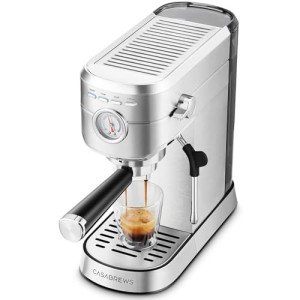Home Use Espresso Machines: A Comprehensive Guide
Espresso machines have ended up being a staple in numerous households as coffee lovers look for to reproduce café-quality brews in the comfort of their kitchen areas. The increase in appeal has resulted in a diverse market filled with numerous models, features, and rates. This article aims to provide a useful introduction of home use espresso machines, helping readers browse their options efficiently.
Understanding Espresso Machines
Espresso machines work by forcing hot water through finely-ground coffee under high pressure, leading to a focused coffee drink called espresso. There are several types of espresso machines classified based on their developing methods and level of automation. The most common types consist of:
- Manual Espresso Machines: These need the user to control the pressure and water flow, allowing for a more hands-on coffee-making experience.
- Semi-Automatic Espresso Machines: These provide automatic control over water pressure, while the user manually grinds and tamps the coffee.
- Automatic Espresso Machines: With the push of a button, these machines instantly control the circulation of water, making it much easier to brew espresso with consistent outcomes.
- Super-Automatic Espresso Machines: These all-in-one machines manage grinding, tampering, brewing, and even milk frothing, making them ideal for users searching for benefit.
- Capsule or Pod Machines: These use pre-packaged coffee pods to develop espresso with minimal effort, but they limit choice in brewing strategies and flavors.
Table: Comparison of Espresso Machine Types
| Type | Control Level | Alleviate of Use | Cleaning Level | Ideal For |
|---|---|---|---|---|
| Manual | User-controlled | Moderate | High | Coffee purists |
| Semi-Automatic | Partial automation | Moderate | Moderate | Home baristas |
| Automatic | Completely automated | Easy | Low | Busy individuals |
| Super-Automatic | Fully automated | Very simple | Extremely low | Convenience hunters |
| Capsule/Pod | Totally automated | Very easy | Very low | Casual drinkers |
Secret Features to Consider
When picking a home use espresso machine, it's vital to think about numerous features that can substantially affect the quality of espresso and user experience.
- Pressure: Look for machines that supply at least 9 bars of pressure, as this is considered optimal for developing espresso.
- Boiler Systems: Single vs. dual boiler systems figure out temperature level stability and the capability to brew espresso and steam milk simultaneously.
- Grinder: Integrated mills permit newly ground coffee, which boosts taste. Think about machines with adjustable grind settings.
- Milk Frother: For those who take pleasure in cappuccinos and lattes, a built-in steam wand or automatic frother is essential.
- Size and Design: Consider your cooking area area and visual choices. Machines can be found in numerous sizes, from compact to large setups.
- Cost: Home espresso machines can range from a few hundred to numerous thousand dollars, so it's essential to develop a budget before exploring alternatives.
Advantages and disadvantages of Home Use Espresso Machines
| Pros | Cons |
|---|---|
| Benefit of developing coffee at home | Preliminary financial investment can be high |
| Quality of espresso is frequently exceptional | Needs some ability, specifically with manual machines |
| Ability to explore tastes | Upkeep and cleansing can be labor-intensive |
| Can save money in the long run | Not all machines will suit every coffee preference |
Upkeep and Cleaning Tips
Preserving an espresso machine is essential for extending its life and ensuring constant brew quality. Here are some beneficial tips:
- Regular Descaling: Minerals from water can build up in the machine. Descale every 1-3 months, depending on water hardness.
- Daily Cleaning: Rinse portafilters, baskets, and steam wands after each use to prevent coffee oils from developing residue.
- Use Filtered Water: This can help minimize mineral accumulation and improve the taste of coffee.
- Replace Gaskets and Seals: These components might wear in time and must be changed to maintain pressure and efficiency.
- Read the Manual: Each machine has specific care directions; following these will make sure longevity.
Frequently Asked Questions About Home Use Espresso Machines
Q1: What is the best budget espresso machine?The best budget espresso machine typically depends on private needs, but designs like the DeLonghi EC155 or the Breville Bambino are popular amongst users for supplying terrific worth. Q2: How long do home espresso machines usually last?With appropriate upkeep, home espresso machines can last anywhere from 5 to 15 years, depending upon the quality of the machine and frequency of use. Q3: Can I make coffees and lattes with any espresso machine?While most espresso machines can make cappuccinos and lattes, having a reputable
steam wand or frother is vital for accomplishing the best milk texture.
Q4: Are super-automatic machines worth the investment?For those who prioritize convenience and quick developing, super-automatic machines can be worth the financial investment, though they might lack some customizability in brew strength and flavor. Learn Alot more : What types of coffee beans are best for espresso?While personal choice contributes, beans identified as" espresso "blends are typically roasted darker, developing abundant flavors and a velvety texture when brewed.
Purchasing a home espresso machine can transform the daily coffee routine into something unique, elevating home brews to café quality. By understanding the different types of machines, essential features to think about, upkeep requirements, and weighing the
advantages and disadvantages, customers can make informed choices that match their individual preferences. As the espresso culture continues to grow, no matter the choice, every brew can be a delicious experience waiting to be savored.

